Episode 10
Pride in the Family: LGBTQ+ Family Experience
S01 - Episode 10
August 09, 2024
26 mins & 32 secs
Speakers
Chris McLaughlin
Soren Peterson
About
Welcome to the last episode of Season 1 as we explore the unique experiences and challenges faced by parents of LGBTQ+ youth. As LGBTQ+ youth themselves (now AND then), Chris and Soren shed light and perspective on the parental journey of understanding, acceptance, and support. Learn about the transformative power of empathy and open communication, and gain insights into how parents can advocate for and empower their LGBTQ+ children. This episode is a must-listen for anyone looking to foster a nurturing, inclusive environment at home.
*Please note that this episode contains sensitive behavioral health topics such as suicide and substance use. If you are experiencing a behavioral health crisis, please contact the 988 Suicide & Crisis Lifeline by calling 988 or visiting www.988lifeline.org.
**This podcast is for information and entertainment purposes only and should not be considered health advice. This podcast is not intended to replace professional medical advice.
Transcript
Chris: Soren
Soren: Chris
Chris: This is our last episode of season one.
Soren: Yes, it is.
Chris: Episode 10. It’s been a journey.
It’s been a journey, my friend. So for this final episode, we really wanted to lean in, I think, more to the conversation of family, especially as it relates to families and queer youth. Yeah.
And we’ve received some feedback along the way that, you know, it might be helpful to give folks listening some tips, some tricks, some perspectives. Yeah. From the perspective of a queer youth, and the perspective of a queer adult and social worker.
Soren: Yeah.
Chris: And so I’m going to put you on the spot first. And I’d love for you and I think you’ve hinted at this over the last nine episodes. But I’d love for you to just share your experience of growing up queer in your home.
Soren: Um, well, okay. So from my youth, I’ve actually, I did have several girlfriends. Third grade, I had a girlfriend.
Chris: As we all did.
Soren: When I was six, I had a girlfriend at my playground, not playground. What’s it called?
Chris: Daycare.
Soren: But I came out fairly unceremoniously in fifth grade. And I’ve been a loud and proud homosexual ever since.
Chris: Can you share, when you say you came out in fifth grade, what did that look like for you?
Soren: Um, I, well, I had been like, I didn’t really know what being gay was as like a societal thing, um, until like fourth grade. Uh, but obviously my parents have always been like allies of the queer community. Um, and, uh, they actually, they didn’t have a real wedding, uh, because, uh, queer, uh, gay marriage wasn’t legalized in Maine yet.
Uh, so they were, they were very ally.
Chris: Yeah. They had a protest.
Soren: Yes.
Chris: Very much. Do you remember when, was it a sit down conversation, like mom and dad, I got something to tell you, or was it just you being you?
Soren: And it just blurted out one day. My mom was watching TV in her bedroom and I walked in and I think that we were like having a conversation about something. And then I told her that I think I am into boys.
I think I like them a lot. Um, and like, obviously she’s very supportive, but at first she was like, are you sure? Because fifth grade is like, I think people see that as a very early time for people to tell what their identity is, right?
What they enjoy. And a lot of fifth graders are quite irrational little creatures. Uh, so she was like unsure and she was concerned the adversity that I would face as like a queer individual operating in society.
Chris: Yeah.
Soren: She was scared. Yeah. And she wanted the best for her child.
And I remember having a number of conversations with her after that, still in like, uh, fifth and sixth grade, um, like on, in car rides, uh, just sort of justifying my rationale to some extent. And obviously she was, she didn’t react with hate. She was just like, are you sure?
Chris: Right.
Soren: And then it just continued as that. And I was very quickly accepted into my family. Uh, I faced no backlash, which is a quite unique situation.
And especially at like such a young age. And then from there, I’ve just always been embraced by my family. Um, and a good portion of the people that I’ve chosen to surround myself with, obviously in middle school, there were several exceptions.
However, like the vast majority of people around me have been very supportive and I’ve faced very little backlash for it. And I’m very grateful for that. And obviously having like my community at home was super important, especially when I was facing backlash in school.
Um, because I had a safe place where I could be myself. Right.
Chris: Yeah.
Soren: And I know that your situation was, um, different.
Chris: So well different in the sense that I didn’t say those words so young, I waited until much later, even though in hindsight, my parents will say, uh, no shit. Like I was the kid that, um, knew all the cheers. I was more interested in what the cheerleaders were doing than what the basketball and football players on the field were doing.
And I knew all the dances. Um, you know, I, uh, loved the idea of painting your fingernails, but it was more about the color. Like I love the idea of, oh, there’s ways that you can integrate color without.
And you and I have talked about this expression of shine and who does whose shine as we grow. And I, uh, quickly learned to dull that shine.
Soren: Yeah.
Chris: Um, that as I grew older, um, the, and the bullying intensified, it was better for me to dull that my own shine rather than somebody dealt it for me in a, in a aggressive or violent way. So I lived a very dulled shine, um, high school, middle school years. And I remember, and I’ll probably never forget this moment of the day after I woke up from like the project graduation, my senior year where I woke up and I distinctly remember I’m done.
Like, I never have to do that again. Yeah. Yet I stayed closeted for another four years and didn’t come out to my parents formally in a, in a letter in writing until 1999.
And you and I have referenced this before. One of the things that was really pivotal to my coming out story was the murder of Matthew Shepard in October of 1998. Yeah.
And that was so impactful to me, uh, on a personal level, as much as I, you know, I, I knew at that point I was going to be a social worker and I’d been working in the health and human services industries across different settings, that death and the media attention of that death and the, um, the duality of the public outcry and the, um, serves them right. Yeah. Outcry that brought me to this place of meeting, making the decision to live my life more authentically.
Yeah. And, um, my parents were incredibly supportive, like to the point of me going, well, that was lame. Like, why didn’t I do that six years ago?
Um, I had done what I think is very common for folks of my generation. You play around with coming out with some friends, you tell siblings, and then you keep these multiple secrets. Who knows who doesn’t waiting with bated breath at every family dinner, who was going to say something inadvertently that was going to.
And so when I made the decision to come out, uh, soon after I introduced parents to, uh, my partner at the time, he was welcomed with open arms. Yeah. And I remember Soren feeling this sense of guilt of not only letting them down because I didn’t give my parents and family and friends the opportunity to know me sooner, but letting myself down.
And so a lot of my work now is spent working with families, working with youth. And I have kiddos that I work with as young as four or five who are questioning, uh, for them, it’s the gender piece of this isn’t my body. Um, and supporting families through that.
And then with preadolescence and adolescence around sexual orientation, puberty is coming and those feelings are starting to intensify. And so you and I have different but similar stories where, um, we were met with, let me say it a different way. The only hesitation we were met with wasn’t about us.
It was about the world we were living. Yeah. Yeah.
Exactly. Fear and anxiety of what might, especially again, in my world and the heels of the, um, of the Matthew Shepard murder. And then, you know, you at your age, we are living in the time where this stuff is still happening.
Yeah. You know, I think of next Benedict in Oklahoma, the 16 year old non-binary teen who was killed by several classmates, uh, in Oklahoma. Uh, this stuff is in the media all the time.
So parents come by that fear rightly.
Soren: Yeah.
Chris: It is not misguided.
Soren: And I think that we have like a gap in like the last 10 years or so where there’s been very limited hate towards the queer community. Although there has been a large amount of it, it hasn’t been like picking up. It’s been decreasing.
Yeah. And that’s an interesting perspective. Now.
I think we’re starting to see, at least in the media, uh, and in some political groups in increased amount of hate.
Chris: Oh, I see what you’re saying.
Soren: It’s, it’s picking up.
Chris: So it had slowed down a bit. Yeah. And I wonder, um, for my generation, that is one of the MTV.
Um, I think about some of the benefits of MTV, the first real life gay man I saw on TV was on the real world, which was an MTV show season after season. It was, it was my generation’s version of survivor, you know, putting a bunch of strangers into a house in a huge city and just letting the cameras run. Um, and so my first same real life, not TV media, like we’ve talked about in previous episodes where the audience rolls eyes and groans and makes disgusting comments.
But my first televised same sex kiss was from the real world.
Soren: Yeah.
Chris: The real world was also where the AIDS epidemic from the eighties, you know, started to get, um, more attention and more mainstream publicized. And so I love, yeah, I think what we are seeing now is the legislation of hate. Whereas maybe before it was the outward violent of hate.
And I would argue when anybody that knows me knows, I talk about this often. I would argue that the legislation of hate, what we’re seeing in legislators, all legislatures all around the country is the legislation of hate. The, um, the attempt to erase LGBTQ plus identities, especially youth, um, under the guise of parent rights under the guise of protecting our youth from the evil queer agenda.
Soren: Well, like it’s, it’s state sanctioned empathy reduction, right? Like I, I feel like a few years ago, there was a vote in Maine about whether or not a conversion camps should be allowed. And that is like, you are legislating whether or not a parent can abuse their child.
Chris: Right. Right. Or a healthcare provider can abuse that child.
Soren: And like, and beating your kids was like, just a little beating was something that was legislated on years ago, whether or not that was okay. Is it within a parent’s right to hit their kid when the kid is misbehaving? Or teachers.
Yeah, exactly. Like is corporal punishment, something that should be allowed on children. Uh, and I feel like conversion therapy is a similar debate.
Is it within parents’ rights to abuse their kid? Yeah.
Chris: Even, and you and I feel very strongly about conversion therapy because what we both know, what I, what we know personally, as well as what I know professionally is that conversion therapy, which is any attempt to change somebody’s sexual orientation or gender identity, typically within the guise, again, of counseling, a retreat, pastoral counseling, any attempt to convert somebody from being LGBTQ to being cisgender or heterosexual or straight is conversion therapy.
Uh, and as you were referencing in Maine, that has been banned for several years. It’s against the law for a licensed provider to do anything that tries to, for youth that tries to change who they are or who they love.
Soren: Yeah.
Chris: Um, that is not the case in other States. And what we’ve seen in other States where conversion therapy has passed laws attempting to, uh, where a ban on conversion therapy has been passed new laws trying to revoke the ban. Yeah.
So legislated hate, legislated abuse, like again, parents come by this fear rightly.
Soren: Yeah.
Chris: And what I’ve talked about with your mom and other adults, other parents, family members is how do parents hold space for two things to be true at the same time? I can unconditionally love and care about and support my child and I can be scared to death for them.
Soren: Yeah. Well, I feel like those are one in the same. Like if you’re, if you love someone and you’re concerned for them, it naturally comes with fear.
Chris: That’s one of the side effects of caring for somebody.
Soren: Yeah. Um, and like, I think that a lot of conversion therapy and stuff, it does come from parents caring about their kids. Like these aren’t heartless parents that want their kids to suffer.
These are people with like a very misguided worldview and a lack of understanding about what it means to be queer and what that is psychologically.
Chris: Um, and I think what I know, and I’ve never had this conversation with my mom before in that, like, so today at 50 years old, my mom seeing the life that my husband and I have and have had for a decade plus now, she wouldn’t change a thing. She wants more grandbaby grandbabies. And I get that.
I get that. She wants a lot of grandbabies, but I think what I know today is she wouldn’t change a thing about who I am and the relationship I have with my husband. 30 years ago, if you had given my mom one magic wish, she didn’t wish me any harm.
She doesn’t wish any harm. Would she have wished my life different? Maybe.
And it’s not because of any animosity or any prejudice or any, um, hate that she has in her heart. She’s one of the most caring individuals I know, but it’s the world that we live in. Yeah.
And so to your point, parents in desperation who want nothing but the best for their kid. Like I believe parents universally wish that their kids have a better, easier life than the life that they had, like in every generation wants their offspring to have it easier. I totally agree.
Which has come with some other challenges and other problems. But I think this idea of, um, I just want my kid’s life to be easy. Yeah.
Or easier.
Soren: Yeah. Is part of being part of love, part of being a human, part of being a parent, which is why I think it’s so like sort of springboarding to another thing dealing with, uh, parents and youth parents love their kids and want them to, uh, feel better and feel good. Um, so when a child is in crisis and a parent is in interacting with them, it’s an extremely tenuous and difficult emotional situation for the parent and they feel powerless.
Like parenting is a thing of action to some extent.
Chris: It’s a verb. Yeah.
Soren: Yeah, exactly. Um, and like when you rob a parent at like you, the same crisis to some extent rob their parents of the power to take concrete action, um, and makes them feel powerless. And then parents with all this, these extreme emotions can lash out because they want to take concrete action to their kids.
And then sometimes that concrete action can be interpreted by their kids as negative, right?
Chris: That’s right. Yeah, that’s right. You know what?
Um, here’s also what I know. Every parent, every single parent I’ve ever met, whether their kid fell and scraped their knee, whether their kid came out and is experiencing bullying or whether their child is dealing with depression and anxiety or a mental health issue and is an emotional pain. Every single parent I know at that moment in time would wish for whatever is causing the pain to go away.
Soren: Yeah.
Chris: And when we live in a world, unfortunately that stigmatizes, oppresses, and tries to fix queer youth, that’s pain. Yeah. So what parents wouldn’t want that to go away?
Soren: Yeah.
Chris: And if they could blink, make a wish, blow out a candle and that which is causing the pain would go away. I get that. That is different than saying, I wish my kid were straight.
Yeah. I wish my kid were cisgender because I think LGBTQ plus youth are damaged or less than.
Soren: Yeah.
Chris: Or I’m sick or twisted. Yeah. What parents are wishing is for the pain to go away.
Soren: Yeah.
Chris: And it’s heartbreaking.
Soren: And like, being queer in, I would say, most cases in today’s youth comes with some degree of mental illness, right? Like the rates of mental illness for trans and queer youth is so much higher than for like heterosexual and or like cis youth.
Chris: And why? Why is that?
Soren: I, I waver so heavily on that. Like, I don’t.
Chris: Let me ask you this.
Soren: It’s very contrary.
Chris: Let me ask you this. If being queer were not stigmatized, were not placed in, in the box of being sick or damaged or pathological, and I’m going to tip my bias, my hand here to my bias. If being queer were not stigmatized, that identity was not stigmatized, would the rates of mental health and those disparities be different for queer youth?
My bias is no. My bias is that the mental health stuff that we’re seeing in higher rates in queer youth is a part of the minority stress that those queer youth are experiencing. It’s the response to discrimination and oppression and turning on the news every day and seeing what states are doing to queer youth.
It’s, it’s knowing that conversion therapy exists and is doing harm to kids. I feel like that’s a huge reason. It’s no different to the reason that I think BIPOC kids, black, indigenous people of color, black and brown kids experience disparities in their wellness as well.
It’s a response to being marginalized, being other, being excluded, being oppressed.
Soren: I agree with you to some extent, but also like, even if there was no stigma around it, it is still like, you are still different. And I think that comes with its own stress.
Chris: Oh, I completely agree.
Soren: I think something unique about being queer is you are diverging from the majority identity. You are different from others.
Chris: That’s right.
Soren: And by diverging from your pre-set path, you have to figure out who you are. And even without any social stigma, that still causes a lot of internal turmoil, right?
Chris: One hundred percent.
Soren: I think queerness and being trans isn’t a mental illness, but it is difficult in and of itself.
Chris: Yes.
Soren: Right.
Chris: Without a doubt.
Soren: And I think that that contributes to mental health difficulties. Also, I think engaging with social media in my youth, I don’t really engage with any of it anymore, but like a lot of the queer communities are also communities where mental illness is normalized. So by engaging with other people that are like you, you are also engaging with communities where there’s a lot of mental illness already existing and being normalized.
Chris: Yeah, regardless of the cause, it’s there. It’s there. It’s there.
And so when you, and I’m not saying you Soren, but I know you Soren, you know, social media wasn’t a thing when I was growing up in the 80s and early 90s, obviously. And so I compared myself to my other male peers, watching them date, watching them hook up, watching them play sports, all the things I didn’t do. That process of knowing I was different and myself wishing I wasn’t different, because if I could have blinked and taken it away, I would have.
Yeah. Which was causing me pain.
Soren: I also, there was like a very large period of my life where I was like, I’m so tired of being this way.
Chris: Of being different.
Soren: Yeah. And I like, for a large period of my life, wished that I could have just been straight. 100%.
Could have been like normal, right? And I still have like idiosyncrasies in my personality that differentiate me significantly from my peers. And sometimes I do find myself being like, I wish I was just a normal kid.
Chris: Right? Whatever that even looks like.
Soren: Yeah, whatever even, yeah, whatever that even is. But like, at the same time, I love who I am. And if I was straight, no offense to straight people, but I’d be boring.
Chris: Yeah. Yeah, that’s a great point. Like, one of my favorite topics in this category and what I work with families on all the time is the idea of queer joy and gender euphoria, where we spend so much time pathologizing the identities, we don’t spend nearly enough time celebrating the uniqueness and difference.
There’s something that’s so cool for me now, granted it’s taken me years to get here. I love going to theaters. I love watching shows.
I love singing show tunes at the top of my lungs. I love listening to Taylor Swift. I love boy bands.
I love Britney and Pink and Christina. I love watching Sixteen Candles and The Breakfast Club over and over and over again. And all of those things may be cliche, but those things bring me queer joy.
And when I’m, you want to see the smile on my face? Like, I’m watching Heartstopper. Yeah.
And I’m watching queer joy. I’m watching sex education, and I’m seeing queer joy. I’m seeing all that could be.
I am my best self when I’m living authentically as a gay man. Yeah. And now I wouldn’t change it for a billion dollars.
Well, for a million dollars. I would change it for a billion dollars. Living easy.
And so I’m thinking about how do we, you as a 17-year-old, me as an almost 50-year-old, how does this translate into supporting families who are wrestling with this? How do we help? So much of our work, you with your peers and me clinically, is helping queer youth realize that it does get better.
And just to hang in there. It gets better. I truly believe that.
Better days are ahead. Best is yet to come. It gets better.
And I’m realizing we’re not doing justice to the families who are supporting those kids. How do we help them?
Soren: Well, me and Chris were discussing this episode topic a little earlier. And like I said a few minutes ago, parenting is a thing of action for the most part. And obviously, if your kid’s in a mental health crisis, something of that nature, there are decisive actions that you can take.
Get a therapist. Attempt to consult a primary care professional about medication. A variety of steps that you can take.
However, it is all about listening. It’s not about deciding, being decisive, attempting to dictate changes. It’s about hearing what the child in crisis is feeling.
And it’s all about empathy. The best thing that you can do to help your child is not to attempt to dictate their life or attempt to augment their choices so that you think that they’ll be behaving in a more healthy way, but rather listening to why they’re making their choices, how they feel. And from there, you can build an understanding and a healthy relationship and dynamic so that you can start encouraging those better decisions.
Right? The number one thing is to first get your child to trust you and believe that you are working together to help them.
Chris: Yeah, authentically. Like you’re not saying you’ve got to trick them into thinking you’re… It’s really…
Oh, sorry. I love this. It’s really like, I got you.
I love you. It’s all that unconditional stuff. I’m a safe person.
You can be… We don’t even have to label it. You can be whatever you are, and that is okay.
And it’s allyship. I believe that parents have to be their kid’s first ally.
Soren: Yeah. I have a friend whose father always calls himself a manager, and both of his parents are like, they assume the managerial role. Parenting in late teens, it can’t be management anymore because your child needs to develop those skills.
They need to develop executive processing skills.
Chris: It’s coaching.
Soren: It’s not a management role. It’s a cooperation. You’re now collaborating with a semi-formed young adult to figure out what is best for them and what is best for their future.
When they’re kids, it is, to some extent, managerial. You can’t engage with them on the same platform. But once they’re 15, 16, 17, 18, and beyond there, you’re now in a team.
Yeah, it shifts.
Chris: You’re working together. The roles shift.
Soren: Yeah. And you need to engage with them like you’re working together. Obviously, you are in a position of authority and power.
But that dynamic creates unhealthy dynamics in the future, right? And it makes the relationship difficult to handle for both parties, right? It just is all about cooperation and empathy.
Yeah, yeah. You just need to listen and work with rather than against or for.
Chris: Yeah, yes. All of that. I want to take that up, Munach.
A couple of weeks ago, we were talking about responding to criticism. And we were talking about strategies that you have found helpful for you when you’re in the moment of criticism. And one of the things you said was to be mindful, to own it, to name it.
And so this feedback for families is awesome. And I want to add to that. Families also have to be mindful about what’s going on for them.
Yeah. So again, in my world, I love holding space for two truths. I can support you and love you and care about you.
And I can be scared to death for you. Yeah. I can be your ally.
And I can be your champion and in your corner. And I can really wish that things were different. Yeah.
And so part of what you’re saying, I also want to direct back to families of listen to your kid. It’s not your job to change them, to name it as a phase or something they’re going to grow out of or any of those other non-affirming statements. But you’ve also got to listen to yourself.
Yeah. And you’ve got to be mindful about what it is that you as the parent or the caregiver need to be your best self in front of your kid. Yeah.
And so all those same strategies of getting your kid a therapist, working with the kid’s doctor around some of the mental health stuff that you were sharing. I would apply that to families too. So parents and caregivers go through a coming out process.
Yeah. That oftentimes is a couple steps back to the process the kid is going through. And it makes sense, right?
The kid’s been living with this in their head their whole life. Parents, for some parents, this might be really new information. The scheme of time, like I’ve only had a month to process this.
You’ve had years to process this.
Soren: Well, that’s what I think is so beautiful about adapting from management and subordinate to a teamship, like a team and cooperation. Partnership. Sorry.
Because now your parent and my parents express to me their emotions, which helps us build a relationship. You need to be open and honest on both fronts. And your kid needs to have an idea of your emotional state.
But if you want them to open up to you, you have to open up to them. It’s mutualism.
Chris: Yeah.
Soren: It isn’t like a one-sided relationship. This is give and take.
Chris: Yeah.
Soren: And in order to form that bond, you have to be willing to open up about your emotions and be willing to engage with your kid in the same way that they’re engaging with you.
Chris: Yeah. Yes. Because I believe, here’s my bias.
I believe it is healthier for a parent to say, Soren, I love what you’re wearing. I’m worried that if you wear this to school today, kids are going to come at you. So are you prepared to have kids coming at you?
Yeah. Rather than the parents saying, get your ass back upstairs. You ain’t leaving the house like that.
You’re going to change immediately. I would rather just have that sense of vulnerability and authenticity with the conversation. It’s okay for a parent to say, Soren, I’m scared for you right now.
Soren: Yeah.
Chris: Instead of trying to control, manage the situation.
Soren: And I think that that makes teenagers so much more receptive.
Chris: Open to it. Yeah.
Soren: To criticism, constructive criticism.
Chris: Yeah.
Soren: By giving your rationale, rather than just saying, I’m the boss, do this.
Chris: Yeah.
Soren: You make your child want to listen to you. Yeah. And you make your child think that, oh, this person has my best interest in their mind.
Because you’re explaining how it will be better for them if they follow your advice.
Chris: That’s right. It’s teaching the skill, the skill of, it’s a social skill, right?
Soren: Yeah.
Chris: If I walk into a job interview, and I’m maybe presenting in a way that doesn’t speak to the professionalism of the setting I’m looking to get hired in, I might not get the job. And so the social skill is there. Learn how to accessorize your shine and turn your shine, your uniqueness to your, as a strength.
Yeah. Not as something that’s going to hold you back.
Soren: Yeah. Like, as a parent, you’re a teacher to some extent. And by teaching, you need to teach the logic behind what you’re saying.
Like, people learn things so much better when they know the backstory.
Chris: Yeah.
Soren: And the reason for it.
Chris: Right.
Soren: Like, by parenting saying, oh, you need to do this without explaining it.
Chris: Because I said so.
Soren: It’s the same thing as having a kid memorize their times tables without understanding what multiplication is. Right. Right?
Right. You need to teach them the basis of your ideas and advice.
Chris: Right? Yeah. You and I were not the kind of kids that I told you so would ever work.
Yeah. And so that’s like one of my number one things to families is that building. I love what you’re saying.
It’s about building and fostering this new relationship that at some point when kids go from this room of their house to this room of the house to go back to last week’s conversation, that you as a parent are shifting rooms with them. Yeah. And evolving and growing with them.
Totally. And meeting energy where it’s at. Like, the I said so, so do it and do it now does not work.
And it breeds resentment.
Soren: It sure does. Yeah.
Chris: Yeah, it sure does. So I’m hopeful that as folks are listening into this, maybe they’re getting some suggestions for how to maybe approach some of these conversations in their own worlds, in their own living rooms and kitchen tables and front seat of cars. And if it is rough, pay attention to that.
Soren: Yeah.
Chris: I’m a big believer in finding community and for families to find community. I wish we had more support groups, for lack of a better word, where parents who are going through this with queer youth could get together and talk and give ideas, give support, give shoulders to cry on, because it’s hard. Nothing that we’re saying is easy.
It takes practice. These are muscles that have to be worked and exercised. I don’t know, Soren, what do you think?
Soren: I think that that’s a fantastic spot to end off the episode.
Chris: So this has been an incredible experience. I just want to thank you for bringing your shine into this podcast studio every week and having these conversations with me.
Soren: I love talking to you and I love to talk. So this has been a fantastic time for me. And I think it’s presenting a really exciting prospect.
Chris: Yeah, I do, too. I do, too. So for our listeners, if you’ve hung in there with us for the last 10 episodes, thank you.
Um, this isn’t the last time you’ll be hearing from the Inspired Insights podcast. Soren and I will be back. We’d love to hear from you in our downtime over the next couple months.
So please reach out and let us know your thoughts. What do you want to hear more of? There are certainly other voices beyond just Soren’s and I that we’re looking forward to maybe welcoming some guests into the podcast studio for season two.
But we want feedback from you. We want constructive criticism, dare I say, from you all of how we can work with you all as listeners and engage you all as listeners in this journey that we’re all on to finding better days ahead and finding our better selves ahead. Yeah.
So in the short term, I am Chris McLaughlin. I’m Soren Peterson. This has been the Inspired Insights podcast season one.
And thank you so much. Bye.
—
The Inspired Insights podcast has been brought to you by Inspired Consultant Group, LLC.
Show More
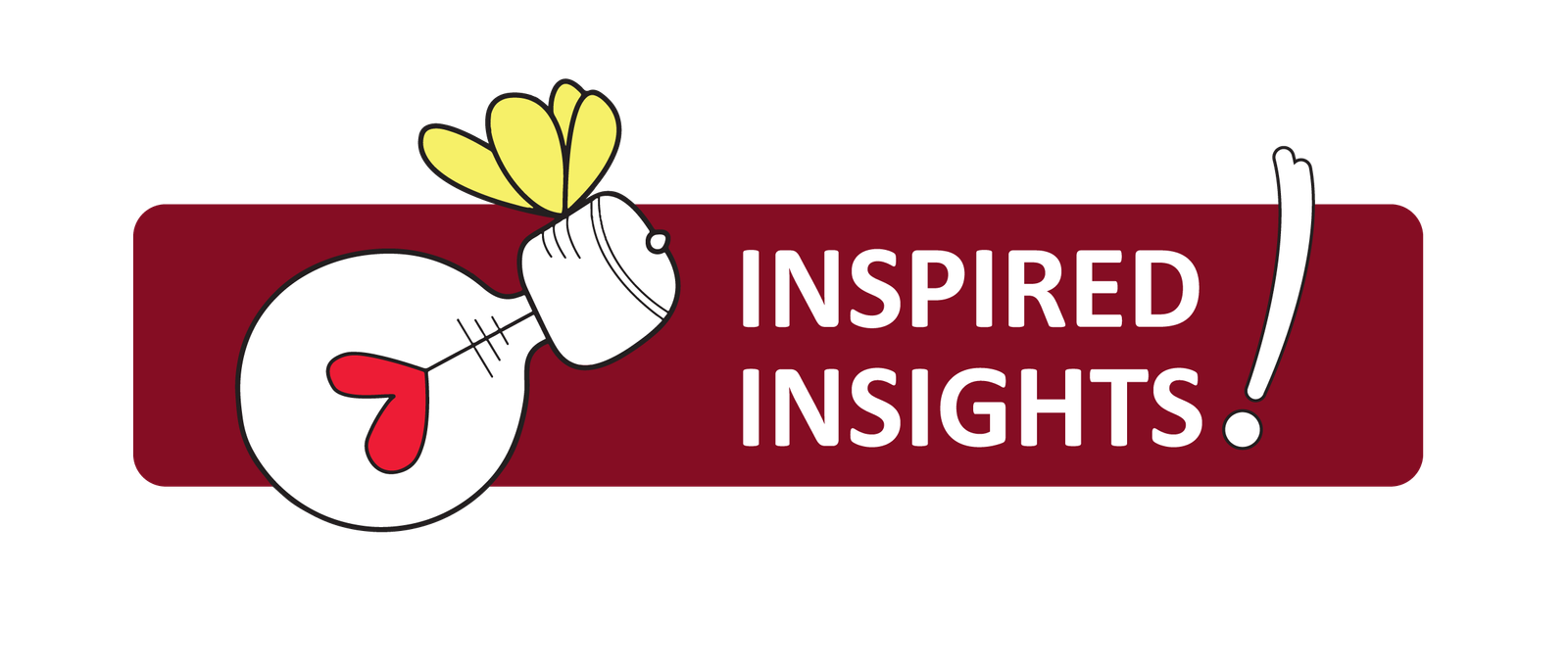
All Episodes

S3E9: College Bound: Transitions to Your Next Era
Soren and Chris sit down with two student life experts, Angela and Andi, to explore the powerful transition from high school to college—and how it reshapes community, mental health, identity, and daily life.
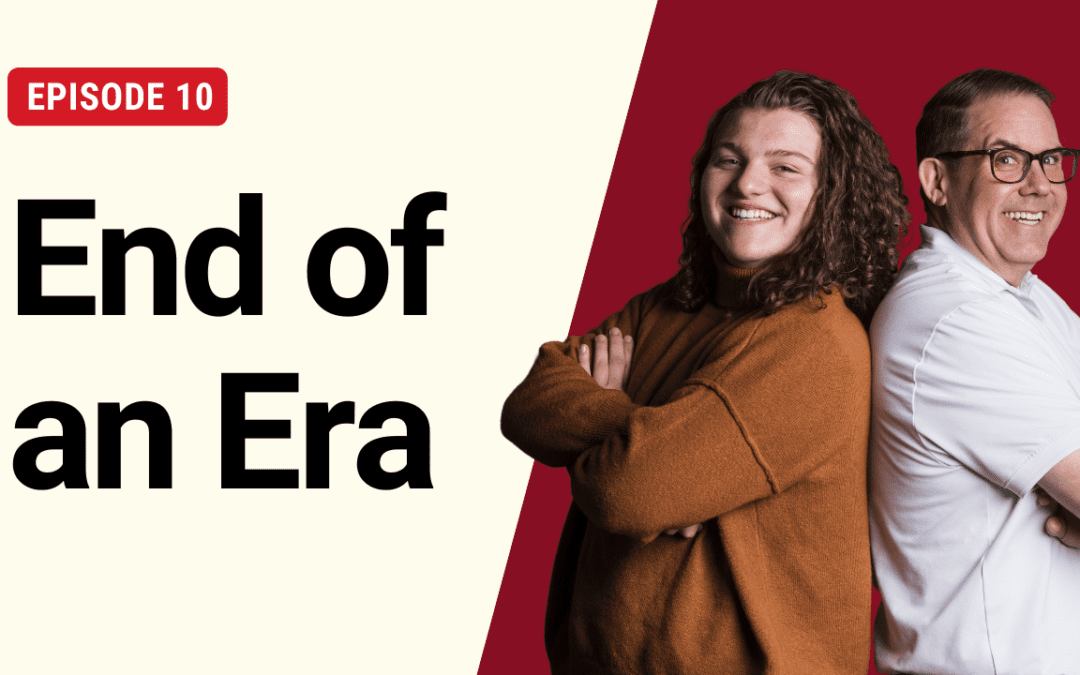
S3E10: End of an Era
Chris and Soren sit down in front of a studio audience filled with family, friends, and past guests to reflect on three seasons and 30 powerful episodes of storytelling, vulnerability, and intergenerational insight.
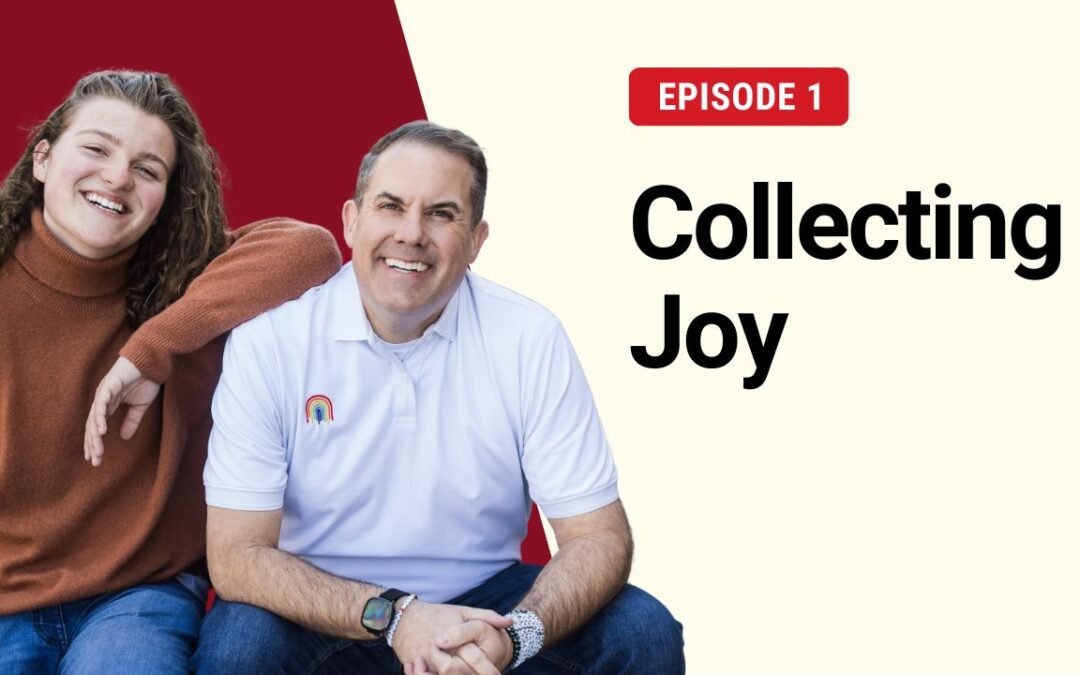
S2E1: Collecting Joy
The start of Season 2 is here! In our premiere episode, Chris and Soren explore the pursuit of happiness through the intentional collection of joy.
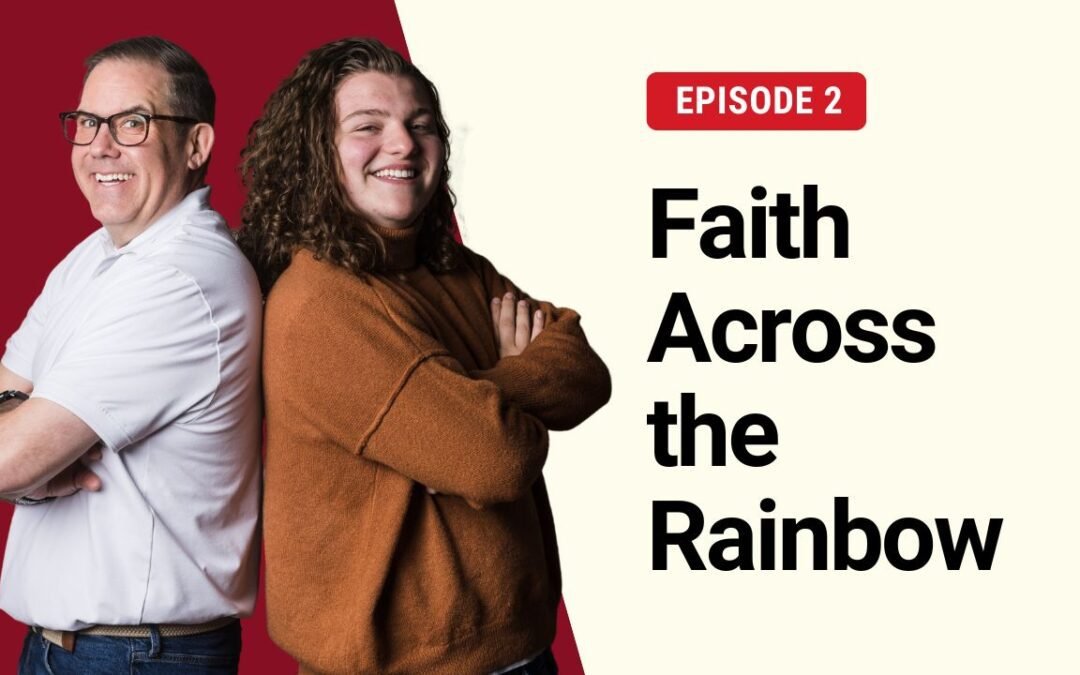
S2E2: Faith Across the Rainbow
Join our guest, chaplain and clinician, Greg Bridges-Music, as he talks with Chris and Soren about navigating the intricate relationship between spirituality and LGBTQ+ identities.

S2E3: Sequins and Smiles
Dive into the vibrant world of drag as Maine’s local drag performer, Dominick Varney, shares personal stories and insights on embodying Queer Joy through the art of drag.
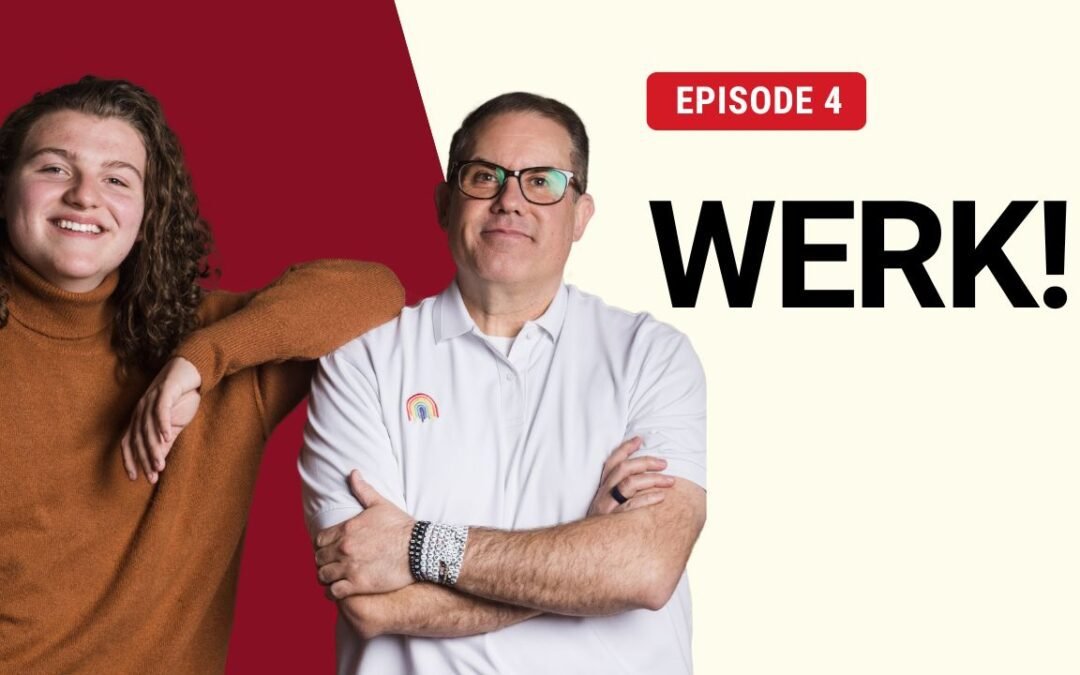
S2E4: WERK!
This discussion highlights how attitudes towards careers, workplace culture, and work-life balance have shifted over time.
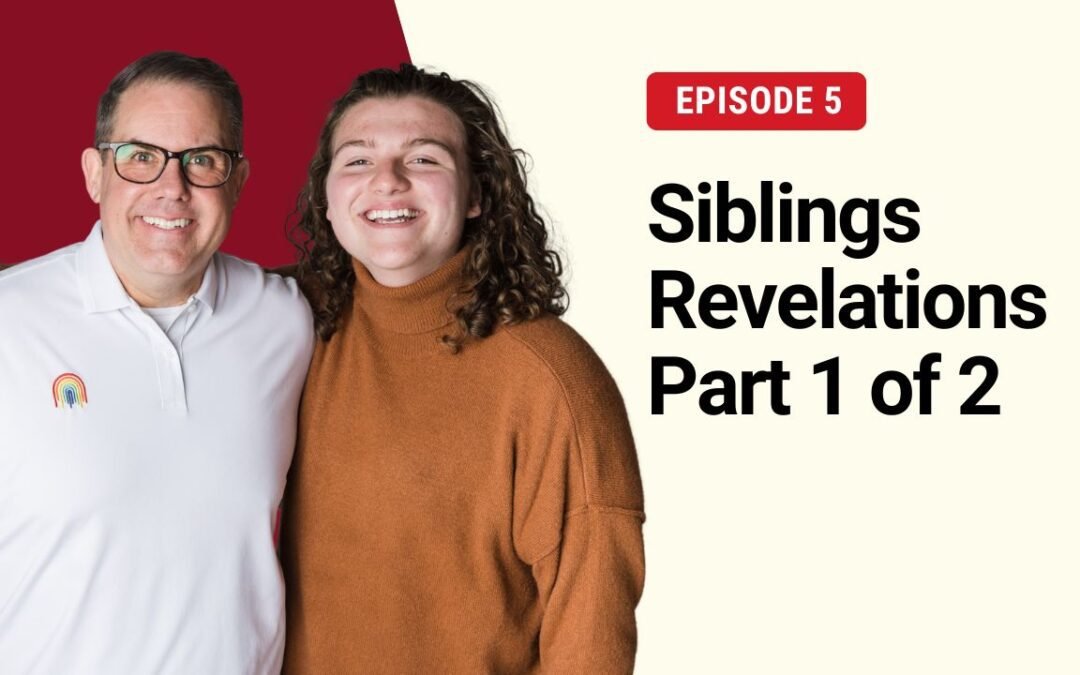
S2E5: Siblings Revelations Part 1 of 2
In this 2-part episode, Chris and Soren are joined by their two younger brothers to discuss the unique experiences and valuable lessons learned from growing up with older queer siblings.
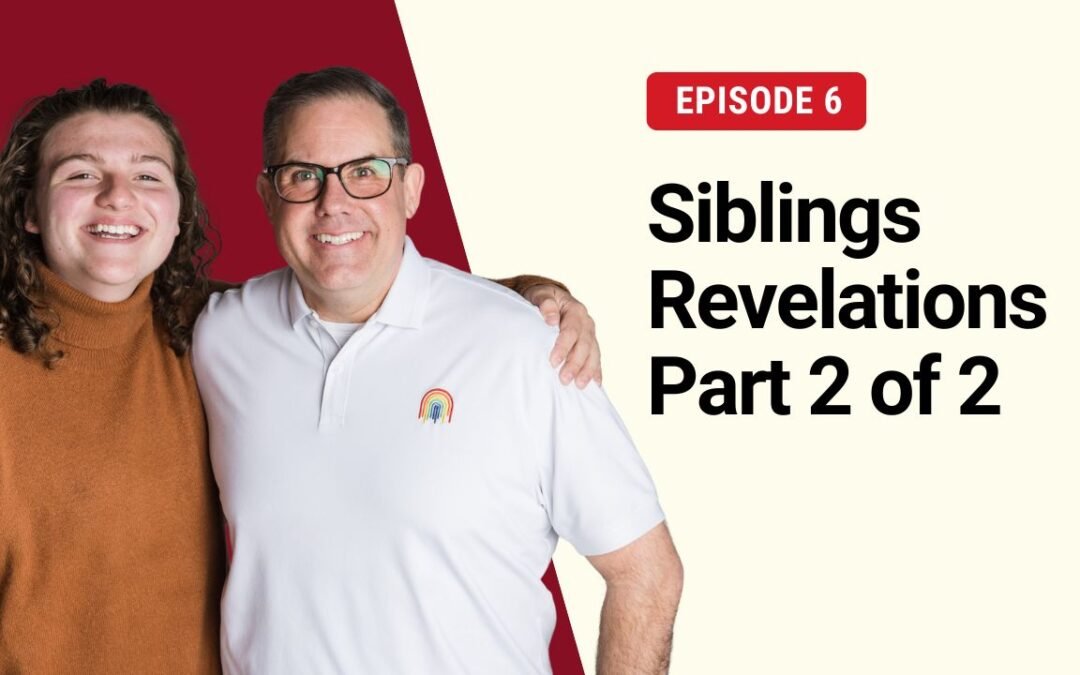
S2E6: Siblings Revelations Part 2 of 2
In this 2-part episode, Chris and Soren are joined by their two younger brothers to discuss the unique experiences and valuable lessons learned from growing up with older queer siblings.
